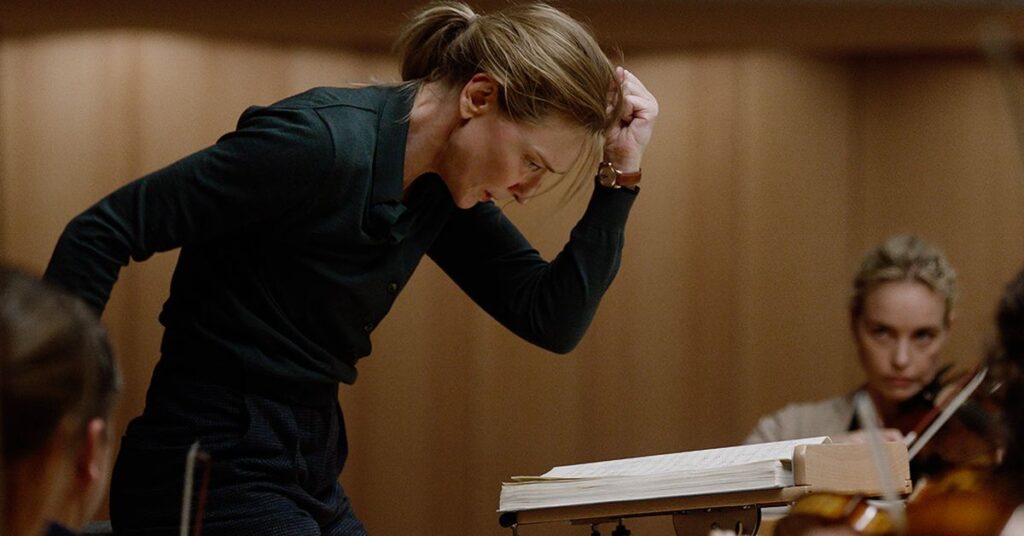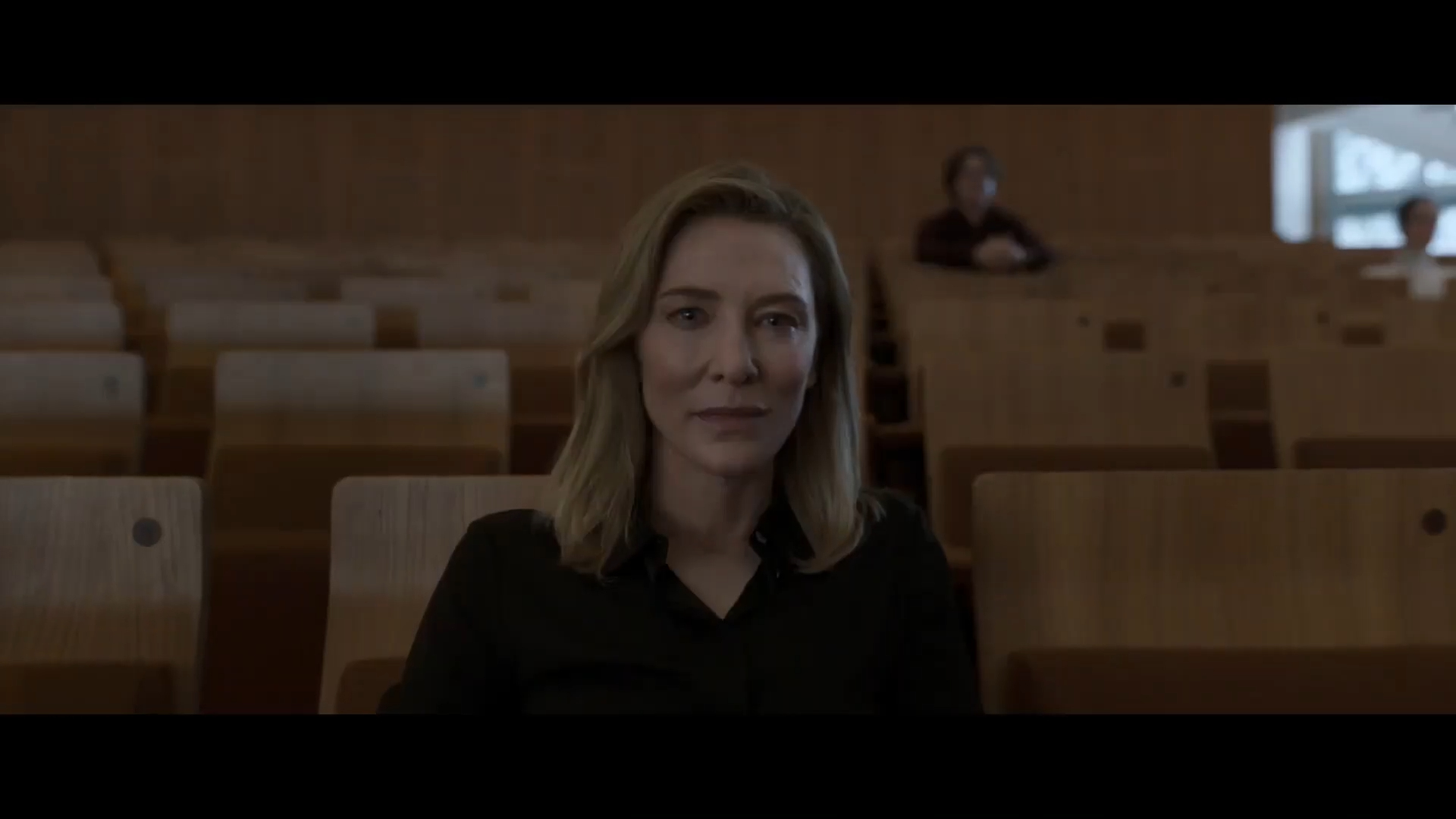TÁR Movie Recommendation and That Ending Explained, because there’s a lot going on with this one! And, I have to say this before we start… what is wrong with this music community?!? Is it me, or is everyone within the orchestral world mentally a mess?!? And TÁR brings us yet another tale of sordid intrigue. Let’s walk through this movie together, and see if we can make sense of that crazy TÁR ending too, shall we?
TÁR Movie Recommendation and That Ending Explained
The fact that Lydia Tár is a woman has literally nothing to do with the fact that she is one of the greatest living conductors. But it is a riveting fact none the less. She is a meat-grinder of a human regardless of her gender. She pulverizes literally anyone that crosses her path. And while at The New Yorker Festival she promotes a couple of different projects. But her biggest? Is her live performance of Mahler’s 5th Symphony… apparently no one has ever managed to do all five, especially his fifth?
Regardless, Lydia relies on Francesca her super supportive personal assistant. The other key figure in her life is her wife, Sharon… who happens to regularly be sick… but is also a concert master in her own right. Got it? Two key figures. K. Great.
Now, Lydia eats with Eliot Kaplan, a conductor who takes care of a fellowship program built for aspiring female conductors. But, she’s interested in opening up to both genders. You know, gut the whole point of the program entirely? Hahaha. She is also hoping to remove her assistant conductor Sebastian with Francesca, you know, her assistant? And she also wants to fill a slot for a cello position. The conversation goes down in a really shady way. You can tell that something isn’t right here. Nothing overtly immoral? Or maybe? But definitely shady, that’s for sure.
In one of my favorite moments in the film, Lydia guest lectures a class at Julliard, and just dresses down one of the students. It’s a wide ranging low-boil of a tirade that she directs at this student. He states his desire to avoid the master solely because his positions against patriarchal identity politics. Lydia though, she tells her class to look beyond these little peccadilloes. Mainly, they should look to the music underneath these differences – and to learn from the things they find there regardless. Well, that doesn’t sit well with the student, and they storm out.
So, pause for a moment. Here we have a lesbian berating a male, gender-neutral pronounced individual, who has stated his own gender fluidity. This isn’t a Cis conversation at all. And yet, we have Lydia tearing into this guy for his gender politics? What is going on here? And you should really ditch your own politics, leave them at the door, because that isn’t what this is all about. I mean, it plays a part, but only in that it flips the conversation of the standard MeToo violence and affirmations. Okay, with that said, we can continue on.
Now, jump to Berlin. There, Lydia is given a novel entitled Challenge. It was sent by Krista Taylor – who happened to be a member of her fellowship program. Now, we sort of have to pick up the next few pieces from a couple different through lines. The first being through some email threads that we are shared. Second, through a couple of different dream sequences. Through these (yes, maybe unreliable, but maybe extra-reliable?) sources we can ascertain that Lydia had groomed Krista. She groomed her into a sexual relationship which eventually came to an end. And because of that, Lydia basically blackballs Krista by telling other conductor friends of hers that Krista is unstable. Lydia also deletes all correspondence she ever had with the woman.
Now, later, during a “BLIND” audition for a role filling the need for a cellist in their orchestra, Lydia notices Olga in the bathroom. It goes without saying that Lydia was attracted to Olga. So, in turn, Lydia changes her score card for the woman. As a result, Olga gets a soloist role in the Edward Elgar’s cello concerto – which, happens to be the companion piece to Mahler’s 5th symphony. You know, sort of a big deal for Lydia right now. Speaking of which, Lydia is obsessively preparing for the 5th recording. resulting in Lydia’s relationships with Francesca and Sharon going in the toilet. Worse, both women notice Lydia’s attraction to Olga.

When Lydia tells Sebastian of his coming replacement, he becomes enraged. He tells her that everyone is aware of her favoritism’s, and how it appears that she is treating these women abusively as a result. Worse, he is certain Francesca will be his replacement which, to him, implies the exchange of sexual favors. But, because of his accusations – which, we should say, were 100% accurate – she changes her mind and selects a different candidate instead.
Now – Krista, unable to get through to Lydia, and at the end of her rope, commits suicide, leaving a note with all kinds of really intense allegations leveled against Lydia. Naturally, Lydia gets a lawyer because Krista’s parents are suing. Screaming women… hauntings… chronic nightmares… flare-ups due to sounds, and inchoate scribbles which look similarly to writings that Krista once made. As she tries to distract herself, she attempts to write new musical compositions, but she is constantly getting disturbed by her neighbor. Her neighbor, who happens to be attempting to care for her dying mother we might add.
Now, let me explain… no, there is too much, I’ll sum up. Eventually after a falsified assault and a resignation by Francesca, a video is released of Lydia’s Julliard class. It goes wildly viral, along with an article from the New York Post. She is met with protestors as she attempts to return home for a deposition wrt Krista’s lawsuit. During the legal proceeding, we learn that Francesca, the once beloved assistant, has shared really damning emails with Krista’s family. Olga abandons Lydia, and Sharon and Petra, her daughter, also leave. And, as a result, Lydia is fired as conductor. And when her replacement, Eliot, goes to record the 5th, Lydia rushes the stage and attacks the new conductor.
The agency advising Lydia – her “crisis management agency” – tells her she must keep a very low profile. And so, in an attempt to do so, she returns to her low-class Staten Island family home where her brother informs her that she doesn’t know who she is or where she is going. Which, is possibly the most succinct thing that could be said about this woman. Flash forward, Lydia heads off to start conducting again. It seems as if, maybe, after some time has passed, she will be accepted back into the saddle again, if only in maybe a developing country’s orchestra somewhere in southeast Asia.
Just before her restart of her career, she heads to a massage parlor. But just as she is to select her masseuse, she sees the women arranged like an orchestra… and there, in Olga’s old position, a woman looks up into her eyes. Lydia, flashing back to Olga, runs out of the parlor and wretches on the street.
As her moment as the new conductor arrives, we watch as she very seriously teaches this group of musicians. But, when she finally begins to conduct, we see that she is conducting the score for the video game franchise, Monster Hunter, in front of an audience of video game fanatic cosplayers.

TÁR Movie Recommendation and That Ending Explained
The thesis of TÁR is simple – if you were to put any woman in a place of power – regardless of position – and she’ll be a one-person sexual wrecking ball…. just as poorly behaved as any other man. Right? That seems to be what the film is saying, isn’t it? Not just sexually, but also domineering and horrible at a million different levels. But to arrive at this conclusion, it would behoove us to walk this movie back a bit and see if we can’t see the roots of this thesis play out.
Jump back to the beginning – Lydia Tár, looking at a pile of LPs, sifting through them. Is she deciding on something to listen to? No. Is she looking for inspiration for her next choice for conducting? Nah. She is standing above these men, sifting them all with her foot, almost derisively… she’s dumped the entire patriarchal on its head and now she alone stands at the top. So, what is she doing? She’s looking for inspiration for her cover photo for her new Mahler album cover. Sitting alone. She is taking inspiration from these men in order to replicate their poses, in order to replicate their traditions, as she undoes it all.
See? And that is just the opening scene. It’s not about the music. It’s not about doing something great, new, and idealistic. It’s about hubris for Tár. Where this film goes all wrong is in its fiction-bending clash with reality. Why? Because Marin Alsop, who is even mentioned in the film, her real history as a female conductor at the highest of international stages, is the exact opposite of everything this film is all about. I actually had the accidental privilege of watching Marin conduct numerous times in my younger years. As a kid, I wanted to round out my appreciation of the arts, so I took dates, and went by myself, to watch the Baltimore Symphony Orchestra numerous times. Alsop was a huge figure in the world of the arts there on the east coast. She was a giant. “We don’t see women at the top of this food chain ever,” said Marin Alsop, during her tenure at the BSO. But what were her thoughts on the film and the numerous similarities to her life, family, and career? “My personal story is one of hope and advocacy, Tár’ is the exact opposite. After 14 years as music director in Baltimore, I think our community knows what kind of person I am and what I stand for.” Alsop’s life was a cool counterpoint to the through line that TÁR seemed to be pushing.
And unfortunately, Alsop has been crushed by questions about the parallels between her own very real life and this fake character. “Because it appears that the screenwriter … read about my life and decided to use some superficial details from my life to write his script, I am in the unfortunate position of having to contend with many questions about this fictional character of Tár, and Todd Field’s film, created without my knowledge or consent,” Alsop wrote in the email to the Baltimore Sun.
Alsop aside, the film is crafted as a real life story… A reenactment of a living composer and conductor. But let me just say the obvious – Tár was not, is not, and never was, a real person. Even though the movie did some interleaving of a significant number of real life people, places, orchestras, etc., etc. So what is the movie attempting to do? Why is writer and director Todd Field working so hard to head fake so many viewers into believing that Cate Blanchett’s character really existed?
Well, in my humble opinion, it seems like Field is attempting to tell a story of a woman who is leaping past her male peers. As the first woman to conduct the Berlin Philharmoniker – who would be the first to have done it, if real. She is whip smart, brilliant even. She’s gloriously talented and esteemed by everyone around her. But she also allows the pride and the glory of her moment go to her head. She utilizes the allowances and flips them into chances to abuse the women around her. So, what is the message that the film is trying to share? Possibly the film’s message could equate to the fact that the #MeToo movement cuts both ways. All people, regardless of gender, are at risk by those who could wield power against them? Seems to fall flat for me though. “OH YEAH? WELL WOMEN CAN ABUSE WOMEN TOO!” Meh. I mean, seems a little obvious… why all this work for that simplistic of a message?
Alternately, the more obvious message I’m connecting with from this movie is that ‘absolute power corrupts absolutely’… could that be the heart of it? It sort of feels like it is trying to share this maxim as a warning tale against fame and glory… over-hyping anyone, male or female will cost you. And I do think that is true as a culture – we so hype such a small few – we give them enormous power over others. And it’s all fairly dangerous. Bezos’ wealth is so enormous, I’m certain that he could find people on the planet that would sell themselves outright to the man if not illegal. Worse, our adoration of the talented, it gives them an advantage over others that is just extraordinarily, disproportionately, unhealthy.
But, I have to say, the fact that I’m still writing about this movie, thinking about this movie, after the fact that I have four other movies to write up, and more movies that I need to watch than I can count, it tells you that I’ve really struggled trying to piece this one together. It is truth that all humans are flawed. It is truth that absolute power does corrupt absolutely. It is a fact that we give way too much power to such a select few. But as a #MeToo statement – it really falls flat for me. How do you grapple with it? What are your thoughts with what Tár’s Todd Field is trying to accomplish here?
Edited by: CY



